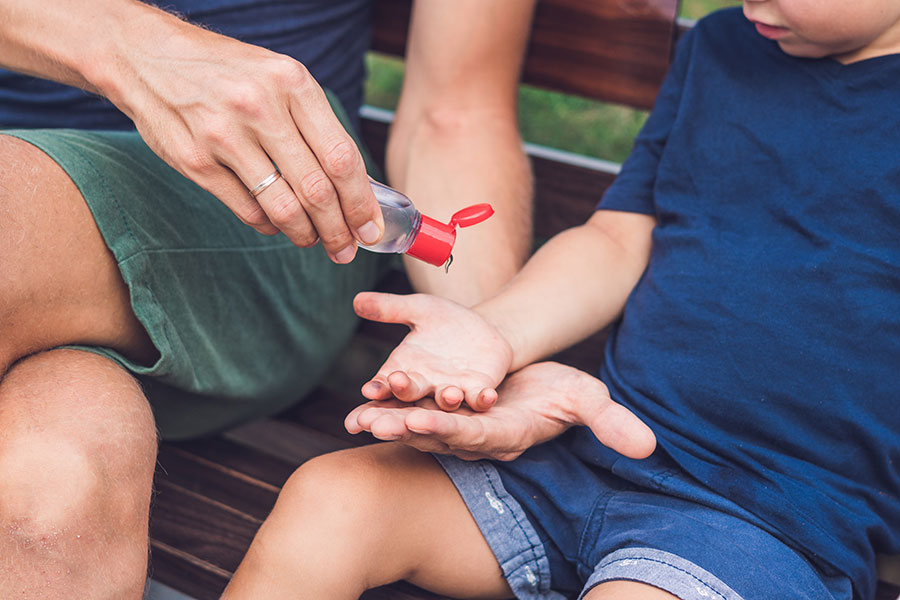Over recent months, the news has been continuously supplying a wave of information regarding the spread of Coronavirus. Have you wondered what to make of it or how much to believe? What are some preparation steps to take for protecting yourself and your family? Below, we discuss the five most important things parents need to know about Coronavirus and what this could mean for your children.
#1. Education is the Best First Line of Defense
Just how you can help prevent the spread of the flu by educating yourself about its symptoms, and how it spreads, learning more about Coronavirus will help you understand where to begin. Furthermore, we help define COVID-19 along with its symptoms and how to notice your exposure to such.
What Is COVID-19?
Coronavirus, classified as COVID-19, is a family of viruses that can cause people to develop a respiratory illness. Typically, this illness previously developed only in animals such as bats, cattle, cats, and camels. However, there are multiple deviations of the virus such as Severe Acute Respiratory Syndrome (SARS) and Middle East Respiratory Syndrome (MERS). According to the Occupational Safety and Health Administration: “Just like there are different types of related viruses that cause smallpox, chickenpox, and monkeypox, different coronaviruses cause different diseases in people. … The novel coronavirus, COVID-19 is one of seven types of known human coronaviruses. COVID-19, like the MERS and SARS coronaviruses, likely evolved from a virus previously found in animals.”
What Are COVID-19 Symptoms?
As there are multiple types of the COVID-19 virus, most reported symptoms of confirmed cases include a mild to severe respiratory illness accompanied with a fever, cough, and shortness of breath. Those with the Coronavirus may also exhibit other symptoms, too, such as gastrointestinal problems or diarrhea. Current estimates suggest that symptoms may appear in as few as two days or as long as 14 days after being exposed to the virus.
How Do I Know If I Have Been Exposed to COVID-19?
Though it may be hard to identify if you were exposed to the virus through a co-worker or someone nearby at the grocery store, look for COVID-19 symptoms in that individual who appears sick. If you think you may have been exposed to someone with the virus who show signs or symptoms of having such or may have even contracted COVID-19, alert your healthcare provider immediately. If you are experiencing any flu-like or otherwise unusual symptoms, tell your healthcare provider about any recent travel to areas where COVID-19 is spreading. Additionally, if you believe that you were exposed to COVID-19 at work, notify your supervisor or occupational health clinic immediately.
#2. Get Up to Date on All Vaccinations
Though the typical flu season may appear to be ending as the weather regains higher temperatures, get your flu shot if you haven’t already. Though the Coronavirus is not a derivative of the flu, contracting the flu is far more common and can equally become as severe. Additionally, make sure that your family is up to date on all necessary vaccines including but not limited to the following: pertussis, tetanus, measles, hepatitis A, Pneumoccocus (age dependent) and Human Papillomavirus (HPV). Doing so will help protect both you and your children by continuing to build up the immune system.
#3. Stop, Drop, and Sanitize
It is imperative to proactively stop or slow down the contagion of any illness, whether it be the common cold or COVID-19. Consider this analogy as you leave a public place. Stop what you are doing, drop (put away) your car keys and phone, and sterilize your hands with disinfecting wipes or hand sanitizer. Covering coughs or sneezes can be effectively done with the use of tissues or the inside of your elbow, followed by a prompt sanitization to protect anyone nearby. Additionally, remind your children to wash their hands for at least twenty seconds with soap and water. They should do so after every bathroom trip, before eating any food, after petting animals, and after coming home. Your goal is to ensure that the health of you and your children stay optimal.
#4. Disinfect to Prevent Viral Spread
In addition to keeping up with personal hygiene, disinfecting household and other commonly used surfaces such as kitchen counters, garbage cans, toilets, sinks, and doorknobs can also prevent the creation of home environments for bacteria and viruses. Furthermore, vacuuming and dusting your home will help prevent a build-up of dust and allergens that could irritate your health or your children’s.
If you own a vehicle, be sure to routinely disinfect and sanitize door handles, steering wheels, gear shifts, and seat buckles in addition to dusting and vacuuming all surface areas. If your children still use car seats or booster seats, add to your disinfecting routine by washing or vacuuming the fabric from their chairs and sanitizing the remaining components, including any cupholders.
#5. When in Doubt, Don’t Wait It Out
If you or your children exhibit symptoms, such as a fever, cough, or shortness of breath, please limit exposure to others and call your primary care provider or 866-779-6121.

